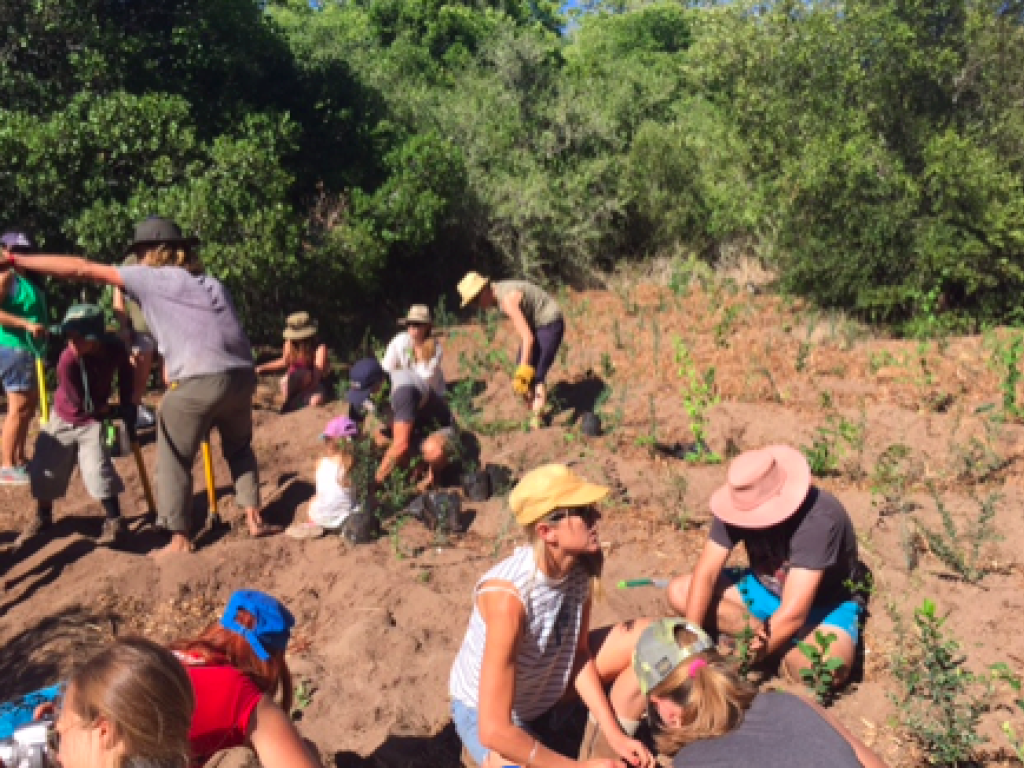Joining the Treevolution: Greenpop Reforest Fest

By Ashley Fox, ACDI Master's Class, 2017
I spent a weekend in March at the Greenpop Reforest Festival Family Weekend camping and planting trees in the Platbos forest with 350 of my closest friends.
For those who are not familiar with Greenpop, they are, in their own words “a social enterprise planting trees, growing food and educating for action across Southern Africa”. The reforest festival focused on planting trees in Africa’s southernmost forest, Platbos. The weekend was a tree-huggers paradise with a program that included yoga, mindful forest walks, arts and crafts, and talks about sustainable lifestyle ranging from upcycled container gardens and low impact families to natural cosmetics and “greening your moon cycle”. The campsite boasted only vegetarian and vegan food options and energetic musical performances from local up-and-coming bands. Of course, the main goal of the weekend was planting trees, so Saturday’s schedule included a full day of tree planting using tried-and-tested permaculture techniques perfected by the Greepop team. Before the weekend was through, we would plant 2,005 trees!
The Platbos forest is quite unique, as it combines old growth indigenous Afromontane species with coastal thicket species. Twenty acres of the old-growth forest were felled a century ago for agriculture, but when the land was found unsuitable, it was deserted and left to be overrun by invasive species. At the festival, the Platbos forester,Francois Krige, discussed many of the challenges the older trees are facing, some of which are related to climate change. Due to the especially hot and dry summers of late, trees haven’t been hydrated enough to produce seed, and instead must clone to reproduce, meaning they lose important genetic diversity needed to evolve to the hotter-than-normal conditions. Greenpop began working in the Platbos forest in 2012, and has focused efforts on removing alien vegetation and planting a combination of indigenous trees: Milkwoods, Wild Olive, Bladder nuts and Pock Ironwoods in their place, clustering them densely so that they can out-compete the invasives. The trees also play an important role as habitat for other species, such as the honeybees that live in the Platbos.
Although the most obvious goal of the weekend was planting trees, Greenpop did an amazing job of promoting sustainable living before and throughout the weekend. The festival prides itself on being “green”, so leading up to the festival, I received a zero-waste festival guide with directions to bring my own cutlery and water bottle, and to avoid non-recyclable waste. I was also encouraged to carpool with others. Upon arriving at the festival, I received a bag in which to put my recyclable waste, which the Greenpop team would collect at the end of the weekend. For those who couldn’t avoid non-recyclables, the Greenpop team also collected materials to make Ecobricks (empty plastic bottles stuffed with non-recyclables), which can then be used as building insulation or even for school renovations! Even the food options were sustainable. Only vegan and vegetarian options were for sale, and there was signage explaining why a plant-based diet is the best option for reducing your carbon footprint and saving water. The festival made sustainable living seem like a realistic option by inspiring easy and accessible actions for the betterment of the planet.
This was the seventh year that Greenpop has hosted festivals to support reforestation in the Platbos. The idea of reforestation is to recreate forests that once existed, or to strengthen existing forests to support ecosystem services, protect biodiversity, and fight climate change. This is different from afforestation, which typically involves planting a monoculture of trees where there previously were none.
Trees absorb carbon dioxide from the atmosphere through photosynthesis, so forests act as an important carbon “sink” by pulling carbon dioxide out of the atmosphere. Deforestation releases this carbon dioxide back into the atmosphere, contributing to global warming. Reforestation efforts have faced controversy in the past, with claims that reforestation projects can hurt more than they help if they are done haphazardly.
Many arguments criticize the use of non-native trees in reforestation efforts, and the complications that come with trying to replace a forest. Further, reforestation efforts are at risk from climate change, as warmer temperatures can increase the likelihood for wildfires, which would release the carbon dioxide back into the atmosphere. The Greenpop team however, take great care to avoid any potential failures in their reforestation projects. They plant only indigenous trees, and leave only a few mature alien trees standing to provide shade for the new indigenous trees as they grow (the aliens are removed once they are no longer needed). Further, rather than working to replace a forest entirely, their efforts are focused on strengthening and maintaining an existing forest. Finally, they are aware of droughts and climate change threats to their reforestation project in the Platbos, and plant near a large firebreak they created by removing invasive plants. Greenpop has planted over 35,000 trees through their Platbos festivals over the years, with an overall survival rate of 85 percent!
The weekend was an inspiring and productive way to re-connect with nature and most importantly, it left me with an important message: we are ALL part of nature, and we all need to play a part in preserving it.
References
Carey, K., 2016. Greenpop launches its 7th annual Platbos Reforest Fest. [Online]
Available at: http://greenpop.org/greenpop-launches-its-7th-annual-platbos-reforest-fest/
Geiling, N., 2016. Reforestation Doesn’t Fight Climate Change Unless It’s Done Right. [Online]
Available at: https://thinkprogress.org/planting-trees-climate-change-solution-3e5b6979561f#.vhsut4wff
Greenpop, n.d. Cape Overberg. [Online]
Available at: http://greenpop.org/our-work/cape-overberg/
Greenpop, n.d. It's a Treevolution. [Online]
Available at: http://greenpop.org/about-us/
Platbos, 2016. About us. [Online]
Available at: http://www.platbos.co.za/about_us.html
Thumbnail image: Authors own.
Disclaimer: The views expressed here are solely those of the author in her private capacity